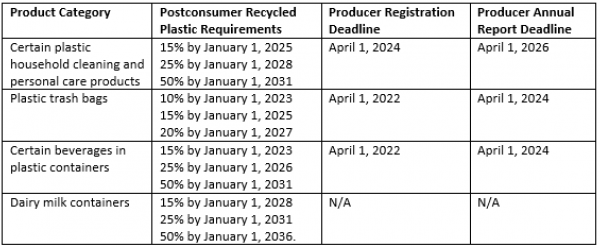Washington State Plastics Bill Imposes Minimum Content Requirements on Many Household and Food Service Products
**UPDATE: Governor Inslee signed SB5022 into law on May 17, 2021.**
Key Takeaways
- What Is Happening? On April 21, 2021, the Washington State legislature passed a sweeping new minimum recycled content bill, SB5022, which creates recycled content minimums for some plastic products sold in Washington State, bans the sale and distribution of certain types of plastic, and establishes registration and reporting requirements for manufacturers of specific plastic products. The bill also bans expanded polystyrene (EPS) and limits how the food service industry can provide consumers with single-use plastic products such as eating utensils and straws. Additionally, the bill also imposes reporting and registration requirements for manufacturers of certain plastic products. Governor Jay Inslee vetoed a similar bill last year, primarily due to costs and timing at the onset of the pandemic, but some news sources indicate that Governor Inslee is likely to sign this bill.
- Why Does It Matter? This bill impacts the food service industry and entities at many points in the supply chain, including: manufacturers, distributors, and retailers of household and personal care products who distribute or sell products in Washington State; recycling facilities; beverage manufacturers that sell or distribute products in Washington State; manufacturers, distributors, and retailers who produce or use expanded polystyrene products; and food and beverage manufacturers, distributors, and restaurants in Washington State that use single-use products will now have additional responsibilities to ensure compliance with the bill. The bill will require manufacturers, producers, distributors, and retailers of the regulated products to examine and potentially revise their supply chains to account for the new requirements.
- What Should I Do? Manufacturers, distributors, and retailers who sell or distribute products within the scope of the bill in Washington State should analyze the recycled content in their current product inventory and make arrangements to increase the percentage of recycled content in their products over the next several years. Manufacturers should also prepare to submit annual reports to the Washington Department of Ecology describing the postconsumer recycled content in their products by weight. Manufacturers, distributors, and retailers should prepare to phase out the use and distribution of expanded polystyrene products in Washington.
Minimum Recycled Content Requirements
The bill imposes recycled content minimums on several categories of plastic products, including many household and personal care products, plastic trash bags, beverages in plastic containers, and dairy milk containers. The covered household and personal care products include laundry detergent containers, cleaning products, oral hygiene products, and soap and shampoo bottles. The bill also covers manufacturers that sell or distribute beverages, including water, soda, and alcoholic beverages, in plastic containers within Washington State.
Additionally, the bill establishes deadlines by which many producers must register with and submit an annual report to the Department of Ecology. These reports must describe the amount, by weight, of virgin plastic and postconsumer recycled content by resin type by percentage of total weight for products that fall within the scope of the bill.

The bill gives the Department of Ecology the authority to conduct audits and investigations to ensure compliance with the recycled content minimums. Companies that do not meet these recycled content minimums are prohibited from selling or distributing their products in the State of Washington. Further, producers that do not meet these minimum postconsumer recycled content requirements are subject to penalties.
Additionally, the bill imposes new labeling and registration requirements on plastic trash bag producers. Beginning on January 1, 2023, plastic trash bag producers must label each container of plastic trash bags sold, offered for sale, or distributed in Washington State with the name and location of the producer or a uniform resource locator or QR code to a website that contains this information.
Expanded Polystyrene Ban in Food Service Products and Packaging
The bill prohibits the sale and distribution of several types of expanded polystyrene (EPS) products in Washington State including food service products such as plates, clamshell packaging, and hot and cold beverage cups. Additionally, the sale and distribution of EPS void-filling packaging products, such as packing peanuts, is prohibited. This prohibition will go into effect on June 1, 2023. Manufacturers, importers, and distributors in violation of the EPS policy may be assessed penalties after receiving two written notices of violation.
Additional Requirements for the Food Service Industry
The bill requires that the food service industry, including restaurants, coffee shops, fast food restaurants, grocery stores, business cafeterias, and any location that allows for the opportunity of on-site food consumption not provide customers with single-use food service products unless a customer specifically requests the product. Affected products include plastic utensils, straws, condiment packaging, and beverage cup lids in certain circumstances. A food service provider who violates this provision may incur civil penalties of up to $2,000 for each day that single-use food service products are provided.
Conclusion
For the last several years, Washington State has been at the forefront of regulating plastics and packaging. This bill reflects the growing likelihood that these recycled content and other design requirements will be imposed on new product categories and in new jurisdictions, despite the challenges that companies may face in obtaining enough the recycled content due to new amendments to the Basel Convention and limited domestic recycling infrastructure. To account for this uncertainty, the bill allows for the Department of Ecology to revise the recycled content minimums based on the availability of recycled plastic and the capacity of recycling or processing infrastructure. The bill originally included an Extended Producer Responsibility Program that was removed in this version.
With an office in Washington, Beveridge & Diamond's Consumer Products and Product Stewardship, Global Supply Chains practices work with U.S. and multinational companies that make, distribute, transport, or sell consumer products in a hyper-competitive and evolving consumer goods market. We help identify, understand, and comply with complex regulatory requirements throughout the product lifecycle. For more information, please contact the authors.











